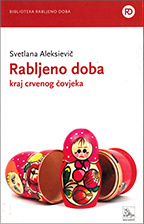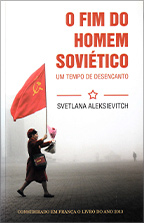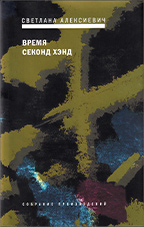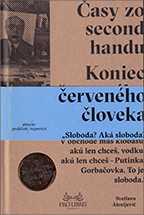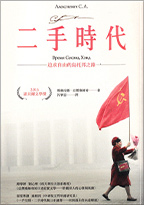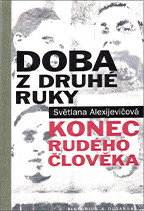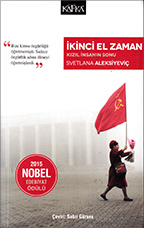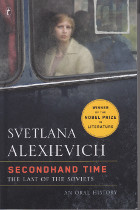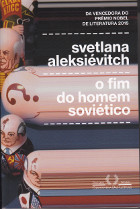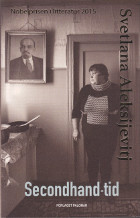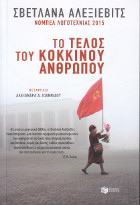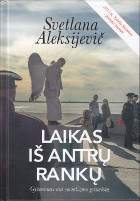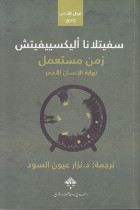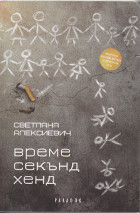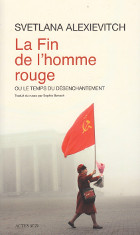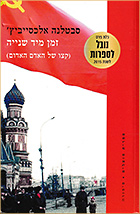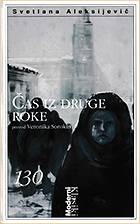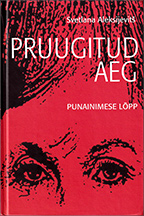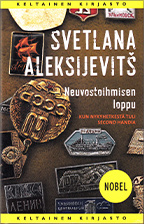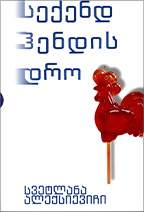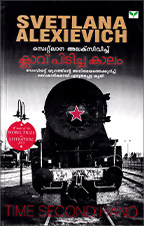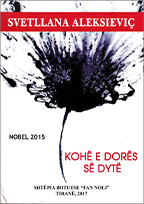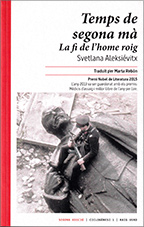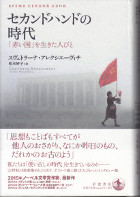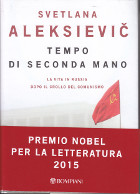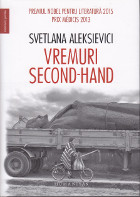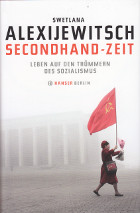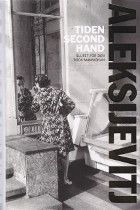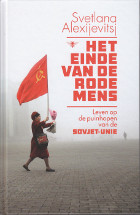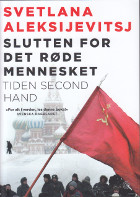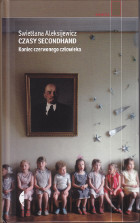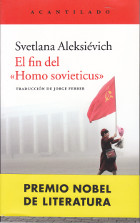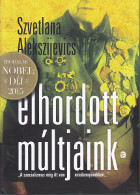Svetlana Alexievich. Secondhand Time
Proposal
Published by
- Suhrkamp, Germany
- Actes Sud, France
- Czarne, Poland
- Ersatz, Sweden
- Edicije Bozicevic, Croatia
- Vremya, Russia
- Bompiani, Italy
- De Bezige Bij, The Netherlands
- Kagge, Norway
- Acantilado, Spain
- Pistorius & Olsanska, Czech Republic
- Porto Editora, Portugal
- Paradox, Bulgaria
- Absynt, Slovakia
- Rayo Verde, Spain (Catalan)
- Citic Press Corporation,China
- Palomar, Denmark
- Fitzcarraldo Editions, UK
- Iwanami Shoten, Japan
- The Storyhouse, South Korea
- Humanitas, Romania
- Európa Publishers, Hungary
- Patakis Publishers, Greece
- Artanuji Publishers, Georgia
- Kitos knygos, Lithuania (rights have been reverted)
- Begemot Dooel, North Macedonia (rights have reverted)
- Penguin Random House, USA
- Fan Noli, Albania
- Companhia das Letras, Brazil
- Epsilon, Turkey
- Owl Publishing House, Taiwan
- Nha Nam Publishing and Communications JSC, Vietnam
- Sanskritbook, Thailand
- Green Books, India (Malayalam)
- Teas, Azerbaijan
- Tammi, Finland
- Cankarjeva Založba Založništvo, Slovenia
- Folio, Ukraine
- Hakibbutz Hameuchad, Israel
Svetlana Alexievich, a writer of international renown, has created a literary non-fiction genre that is entirely her own. She writes “novels of voices.” She has developed this genre book after book, constantly honing the esthetic of her documentary prose, which is based on hundreds of interviews. Her skill at this allows her to intertwine the original voices of her subjects into an artful condensation of a panorama of souls.
It will soon be twenty-five years since the Soviet Empire collapsed, allowing the Russians to discover the world and the world to discover the Russians. This was followed by a short period of mutual infatuation, but the “Happy Ending” that had been expected for world history is being cancelled. The world is slipping back into the Cold War. While, in the West, they still recall the Gorbi era fondly, in Russia, they want to forget it, and call it the “Russian catastrophe” and even the “geopolitical catastrophe” (Vladimir Putin). A new generation of Russians has grown up in the meantime, one whose dreams are not of peace as were the dreams of their parents in the 1990s, but of revanchism. The younger generation pines for the old grandeur, and long for a new Empire. T-shirts and dresses with pictures of Putin and illustrations of Medvedev (whose name means bear) as a Russian bear just waking up from hibernation are popular. It has become fashionable to wear buttons with Soviet symbols on them. Steel buttons for the poor and gold buttons for the rich. Opinion polls show that 70% of the Russians consider Stalin a great man rather than a tyrant. This is the new Russia, but not the new Russia that we dreamed of. There are enough totalitarian topics to discuss to last for yet another hundred years.
Svetlana Alexievich is one of the best-known authors working on this topic. Her “factional” chronicle entitled The Autobiography of a Utopia, or the History of the Red Man has been thirty years in the making. At present, four of the planned seven books have been completed. They have been translated into dozens of languages, and have been brought out in more than a hundred editions world wide. This demonstrates that the experiences of the period of “Red Civilization” are not considered a part of dead history. Russia frightens and interests the world as it did once before. It is a large, unpredictable country in the center of Europe.
A number of years ago, when the author was nominated for the Nobel Prize, both Russian and European newspapers wrote that “what we have here is a unique project, unprecedented in the annals of world literature.” The idea itself, said the critics, is unique: to follow the course of Soviet and post-Soviet history and of “Homo Sovieticus”, and to document it literarily. The genre which the author has chosen to develop this topic, from one book to the next, is also unique. It is ‘the little people’ telling about themselves. It is simultaneously the macro and micro history of a great time. The confessions of hundreds of human beings, telling about how people believed in the system, how they killed and died for an idea, telling about the secrets and the horror of Communism. There are accounts of Stalin’s GULag, of the wars, of Chernobyl, of the disappearance of the socialist Atlantis, which was a catastrophe – not only for Russian Communism, but also for the whole of the traditional political left wing. While reading these books, one stops to think: what is a Russian and what is Russia. Why are they unsuited to rapid modernization, and why, after almost two hundred years, having spilt a sea of blood, are they still bogged down on the threshold of Europe? Why is this dangerous both for them and the world itself?
In her new book, the author continues following the course of time and the hero of her previous works, investigating everything that happens to the Russians, or rather to the post-Soviet (wo)man in the ruins of their recent history, looking at the road they are taking—which has already reversed direction—from Socialism to Capitalism. Not long ago they felt they were at the center of the world. They were living in the capital of the future. But now, they find themselves in a third-world country. They have discovered that they are on one of the back streets of history. “My writing cannot keep up with time,” says Alexievich in one of her interviews. “Reality is changing very fast these days, and has become more fantastic than anyone’s imagination. We can no longer predict our own future, and have no idea what to dream about. . . . Unlike Chekhov’s heroes, we cannot say that life and mankind will be wonderful a hundred years from now! A hundred years after he wrote those words there was Chernobyl, the attack on the Twin Towers in New York. We came out into the wide world and saw ourselves, and have returned to the same old question: are we Europeans or are we Asians? We would like to be Europeans, but we don’t seem to be able to. Why is that? That’s what my new books are about.”
The book “Time Second Hand” is the story of the last twenty years of Russian history, which has shaken the world once again.
Part one: “The Comfort of the Apocalypse” is about how it all began. It all began with dreams of Capitalism with Gorbachev’s human face. In the Russians’ dreams, Capitalism was sort of like Communism. The world imagined that everybody in the USSR wanted change. That is not the way it was! One morning in 1991, the majority of those in the Soviet Union awoke to find themselves in a strange land, and they were confused. They did not know how to live in it. And a large number of them did not want to live in it. This had been a revolution from the top. The majority of the people had not been dreaming of freedom. They did not know what it was. How could they have known? They just wanted to live the good life, to live like people lived in the West. And the West is just one great big supermarket. And freedom turned out not to be much fun, but hard work of a kind to which they were not accustomed. Things took a strange, unexpected turn. It was criminal. Bandits took over, robbing the country. Now some can buy airplanes and islands, while others don’t have enough to buy a loaf of white bread.
It seems as if we have read about this before, and know about it, but concentrated in the book, it becomes a portrait of the new Russian world. Dozens of people describe what happened to them, laying out the details of their lives, their feelings and thoughts. This gives history a human face. The reader can see and hear the rumblings of this giant mass of human magma that is Russia; what is going on in the Russian boiler, where no one knows what’s cooking inside, or if it will explode.
For the first part of her book, the author takes a look at the stories of ten suicides, “An Interior Scene in Red” against a background of the ruins of Empire. During the 1990s, Russia took first place in the world for the number of suicides, hundreds of thousands of them. Those recounted in the book are a Marshal, a poet and just plain folks. But this is not just a story of suicides, but of the suicides of precisely those people who were unable to adjust to the new life, those who, having grown up with the Communist ideal, had become its prisoners, had placed an equal sign between it and their own lives. The magic of the great lie had been too much for them. Those whose suicides did not succeed tell their own stories. The stories of those who were successful are told by their family and friends. The stories that they tell are simultaneously about their own lives and about “homegrown” socialism, about the eternal human dream to build a city in the sun, about justice and equality, and about how that experiment ended in Russia, and with it their sense of purpose for their lives.
These ten stories are combined with a choir of voices from a Russian kitchen to create a portrait of the people and the country and the times. Why a Russian kitchen? That is the birthplace of truth for the Russians. No matter where you go, they will always take you into the kitchen for serious discussions of work and of politics, of the war in Chechnya and of religion, of the commonplace and of the eternal.
The second part is called “The Enchantment of Emptiness.” It is the story of how Russia has changed, what is going on there today, what is going on in the country and in the minds of its people. Everybody in the book talks about why Russia did not end up where they wanted, where they dreamed about. They all feel cheated. Why hasn’t Russia been able to change? Why it has come to hate itself, its degradation, the whole world. There are very few winners. The majority are all losers, who have lost their way and feel aggressive. The socialist utopia has been replaced by a monetary utopia. The old system of values collapsed completely, but there is not a new one to replace it. And just as it was in the Middle Ages, the only hope is religion. Instead of posters extolling “Glory to the CPSU”, now there are posters that say “Christ has risen!” One president after another announces the search for a new national ideal, but everywhere you look is emptiness. The people feel alone. From academics to street-sweepers everyone is in search of the meaning of life. If the world was once divided into those who read Solzhenitsyn and those who did not, then today is it divided into those who can buy and those who cannot. New thoughts, new feelings, a new (wo)man, but in many respects still a Soviet (wo)man. The author scrupulously assembles the Russians’ new and old characteristics both for historians and so that Russians themselves can comprehend who they are.
Following the most recent decade’s conversations from a Russian kitchen, there are the tales of ten more suicides. These are the suicides of today. They have different reasons than the suicides of yesterday. Romeo and Juliet is replayed in the periphery of the former Empire as nationalistic conflicts flare up. The Armenians are killing the Azerbaijanis, and they are returning the favor, so an Armenian boy cannot marry an Azerbaijani girl. That’s one story. Another is of a policewoman who was sent to Chechnya. After three months she shot herself, leaving a note: “I never knew that it was so easy to kill someone. I can’t live with that.” She left a five-year-old daughter and aged parents behind. Or there is the story of the woman who survived the tragedy of the hostage-taking incident in the theater “North-East” in the center of Moscow. She was unable to lead a normal life. She would go outside in the morning, ride the subway, run errands, but everywhere she went she saw death. Fear is taking up a bigger and bigger part of our lives. We are becoming a civilization of fear.
Whereas the Russians’ previous life was called Socialism, their new life still does not have a name. The people in her book talk about themselves and where the ship of state called Russia is headed; they wonder about the end of the Red (wo)man and the start of a new kind of being. But what kind will it be?
